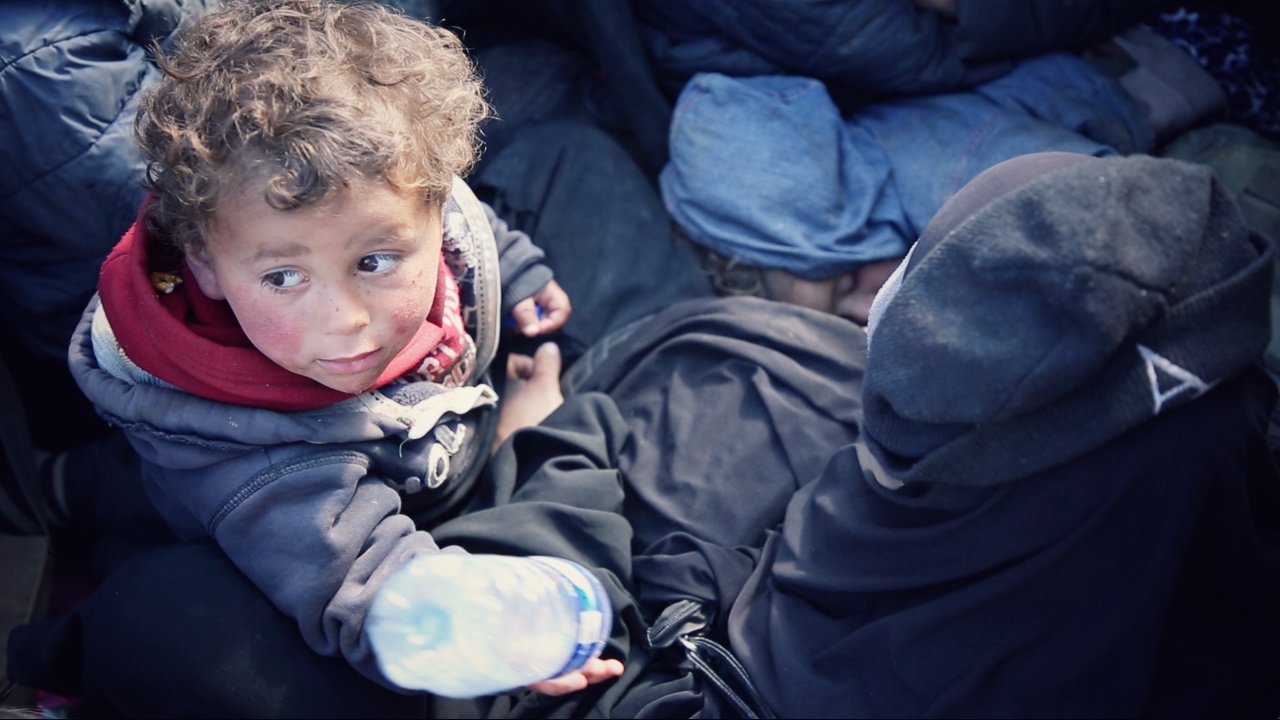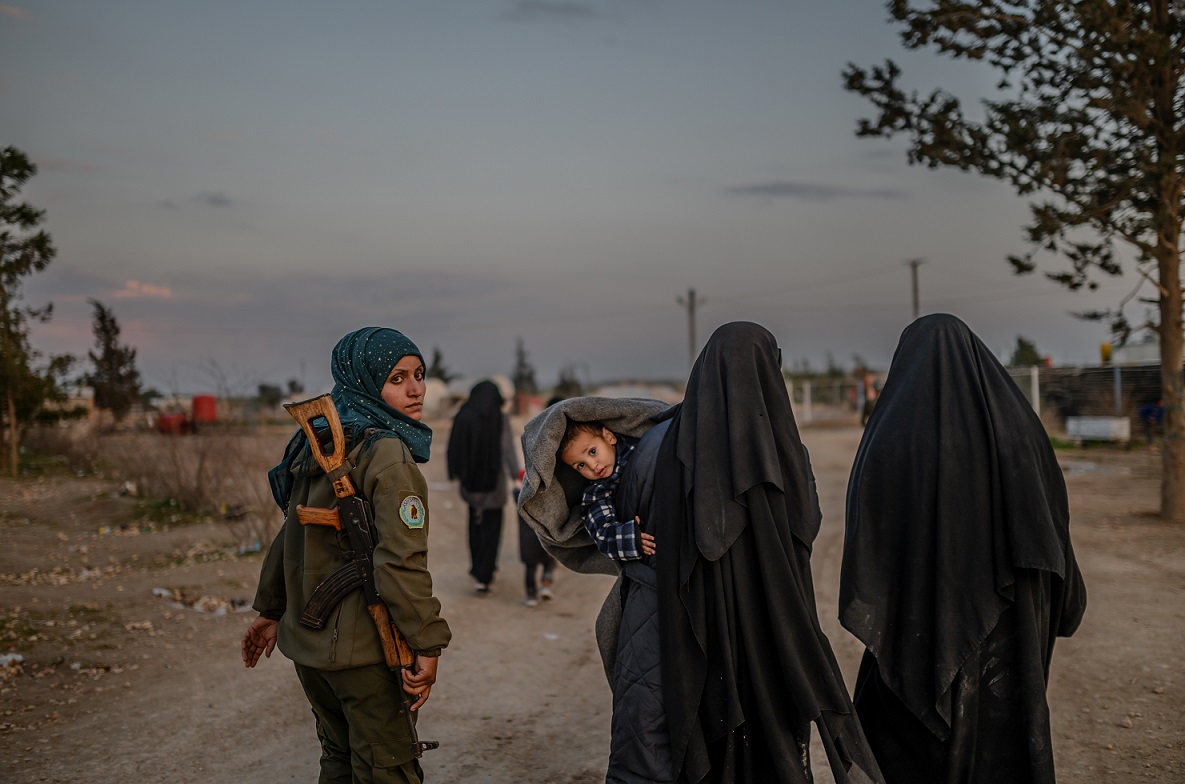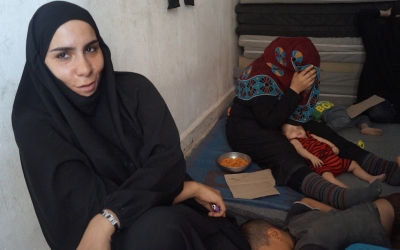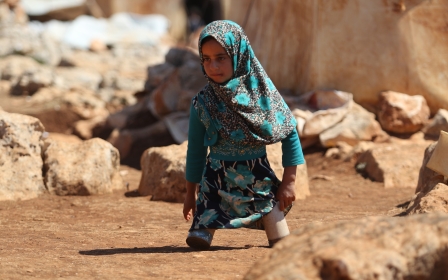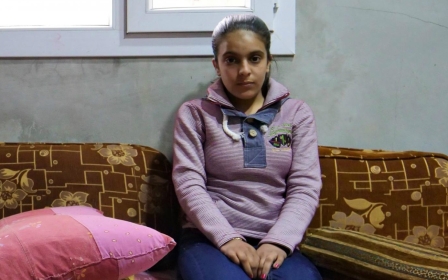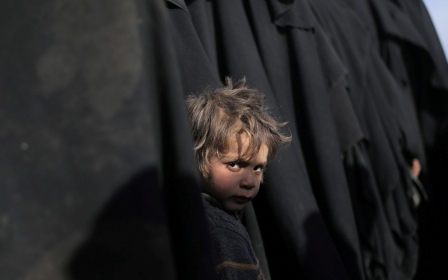Defiant or repentant, Islamic State's foreign women have no hope of return
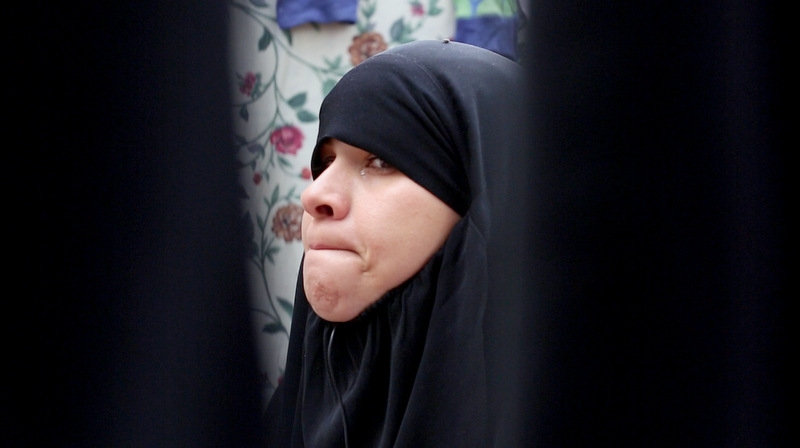
Every day, hundreds of civilians and members of the Islamic State (IS) stream out of Baghouz, the group's last stronghold in Syria, currently under fire.
"There are still thousands of people hiding in the tunnels," an Iraqi woman tells Middle East Eye.
The 38-year-old woman, married to an IS fighter, has just fled with her two children from the assault launched by the Syrian Democratic Forces (SDF) with the support of the international coalition led by the United States.
Foreign women were the worst, even worse than men
- Yazidi woman fleeing Baghouz
She says that France represents the third-largest nationality of people still in Baghouz, before she is drowned out by the sound of rocket fire from the SDF, piercing the sky of the desert plateau.
After a thorough check, the SDF parked her with two French women in one of the cattle trucks used to evacuate civilians.
New MEE newsletter: Jerusalem Dispatch
Sign up to get the latest insights and analysis on Israel-Palestine, alongside Turkey Unpacked and other MEE newsletters
One of them, Julie, a native from the southeastern city of Lyon, speaks of what moved her to join IS.
"I moved to Syria in 2012," she says. "What prompted me to come is the policy of [former French president] Nicolas Sarkozy and the issue of secularism. We could not practice Islam as we wanted."
The woman, in her 30s, makes no mention of the actions committed by the Islamic State.
But Julie doesn't seem to regret anything. "I didn't want my children to study the monkey theory [Darwin's evolution theory] in France, but to learn that we are children of Allah in Syria."
However, she quickly realized that her children would not be educated under IS rule.
"My children didn't go to school, I lost two girls in bombings, and I ended up begging in Baghouz," Julie says. Today, she "wishes to fully enjoy [her] religion and settle in a land of Islam, like Morocco for example".
Just as Julie and other spouses or relatives of IS fighters were evacuated from Baghouz, so were Yazidis, direct victims of IS.
"Foreign women were the worst, even worse than men," a Yazidi woman tells MEE.
A 'micro-caliphate' in the camp
Like many others, Julie is transferred to the al-Hol camp, in the Hasakah governorate.
While France confirmed earlier this week that it had repatriated several young children from displacement camps in northeast Syria, French authorities remain silent on the broader fate of other citizens who are or were affiliated with IS.
I didn't want my children to study the monkey theory in France, but to learn that we are children of Allah in Syria
- Julie, French spouse of IS member
Al-Hol, which hosts civilians, wives, widows and children of IS fighters, is now overcrowded. In addition to the sudden arrival of 927 refugees from Tall Afar and Mosul in November 2016 during the Iraqi army's offensive against the Islamic State, the camp also hosts refugees from the battles of Deir Ezzor and, now, Baghouz.
Women and children represent 90 percent of newcomers. Al-Hol's camp population has risen to more than 65,000 people and is growing rapidly.
In addition to the difficult living conditions, a "micro-caliphate" is now being formed in al-Hol, according to testimonies gathered by MEE. A number of female IS members who recently arrived from Baghouz have reportedly gone so far as to burn the tents of those they feel have become detached from the group's ideology.
A similar phenomenon was witnessed in the Roj camp, near the northern Iraqi border, and Ain Issa camp, in central Syria. Since the beginning of the Islamic State's territorial decline in Syria, the camps have welcomed thousands of civilians, including families of the group's fighters.
The Roj camp, about 30 kilometres from the Iraqi border, is surrounded by oil well fumes. There, IS women - nicknamed "Daesh refugees" by the Kurdish authorities based on a derogatory Arabic acronym for the group - are not separated from other civilians.
When MEE visited the camp in September 2018, Sophia, a 45-year-old Belgian woman, had been living there with one of her daughters for a year and a half. Her eldest daughter, an adult, had chosen to stay with IS.
In 2014, Sophia flew from Brussels to Gaziantep, a Turkish city close to the Syrian border. "There, we were picked up and taken to Jarablus, then Raqqa,” she recalls. “I spent a year in Manbij, and, when the city was rebuilt, we went back to Raqqa."
Some women, like the French, exert enormous pressure on others [to] control us and maintain Daesh's order
- Sophia, Belgian citizen and former IS follower
Why did she come to Syria? "Daesh sold a great 'social project' to my elder daughter, then 24 years old. I realized it was a trap once here," she says.
"In Manbij, I avoided the French, who are complicated and dangerous. They always seek to file a complaint in the Islamic court. They are poorly educated and like to watch torture and abuse."
Sophia says she has been strongly affected by the attitude of IS women. "To celebrate the attacks in Europe, they gave sweets to the children. In the madafa [place where guests are welcomed], women celebrated this," she says. "They are scum."
Sophia now nicknames the Islamic State "the planet of the apes".
She recollects her escape: "In Raqqa, there were dissidents and people who were afraid of bombings. The Kurds [of the SDF] were advancing. My pregnant daughter fled across the Euphrates [to Hajine] to follow Daesh.
"I was scared, and I've wanted to leave for a while. It takes $5,000 to leave the Islamic State, and you have to find someone you can trust. So I surrendered to the Kurds."
When she finally managed to leave the IS stronghold and arrived at Roj camp, she says she found there "a small caliphate," this time controlled by the women, a real "matriarchate".
"In the Roj camp, I ended up experiencing what I wanted to leave," she says.
"Some women, like the French, exert enormous pressure on others. They work in pairs; they control us and maintain Daesh's order. They should stay in Syria because they are really very dangerous," she says.
Redemption and concealment
However, when MEE spoke with these supposed "jihadists," many expressed their repentance.
Many IS women seem to have integrated a smoothed, redeeming discourse to allow their reintegration into their societies - a discourse which, some fear, will turn them into ticking time-bombs.
"I know I'll face 10 years of prison in France. But it's been a lesson to me. Today, I am learning from my mistakes," Julie says confidently.
Delia, a 35-year-old German woman in Roj camp, says the same. Her husband is in Dayrik - also known as al-Malikiya - in a prison for IS fighters, awaiting trial.
"I can understand why Westerners are afraid of Daesh, I have been in it and I am ashamed. Today, I don't want to be called a 'Daesh woman'," she says.
"When I arrived, it was not forbidden to come to Syria. And now, in the camp, they know who's good and who's not, but they leave us together. Some don't even mention that they are German. They hide because they want to keep fighting," she continues with a tired voice.
It was a lie, a trap. Daesh was a game
- Khadija, Tunisian citizen
A similar discourse is repeated in other camps visited by the MEE, such as Ain Issa in central Syria. During the Battle of Raqqa, this camp hosted thousands of civilians, including wives and widows of IS fighters.
One of them, Khadija, whom MEE first met in December 2017, was in charge of both interviews and medical appointments for children. "I made a huge mistake, and now I don't know how to repent," the 28-year-old Tunisian said in perfect French.
"I am disappointed by Daesh, by [IS leader] Abu Bakr al-Baghdadi, whom we have never seen. It was a lie, a trap. Daesh was a game."
What future for children?
The involvement of these women in the Islamic State's crimes is uncertain, and the evidence is difficult to collect. But what about their children, to whom they can transmit their ideology?
The youngest, whether foreign nationals or stateless, live in difficult conditions, isolated in camps, silent victims of their parents' choices.
Some of them, in Ain Issa for example, seem disconcerted, totally under the influence of Daesh's ideology, shouting "kuffar" (unfaithful), their index finger raised as a sign of allegiance to God that has since become a sign for Islamic State members, and shaking frantically in front of journalists.
For Nisrin Abdullah, a spokesperson for the YPJ, a Kurdish military organisation part of the SDF, the post-Baghouz period will be particularly complex to manage.
"Daesh families in our camps come from 49 countries. What are we going to do ? If we can't educate them, the next generation will be a big issue,” she tells MEE at a base in Qamishli. "Women are likely to raise them with a desire for revenge, and another war is foreseeable."
This fear is shared by the Western countries from which these families come, such as Belgium and France.
"A Belgian parliamentarian, Georges Dallemagne, came to visit the women," Sophia recalls. "They've seen so much horror that they think we're all monsters.”
In December, a judge urged the Belgian state, in summary proceedings, to repatriate six children of Islamic State members. However, the decision was invalidated by the Brussels Court of Appeal at the end of February.
"Members of the BND, the German intelligence service, came to meet me twice," says Delia. "They gave me no hope of returning, not even for my children. Three of them were born in Syria. Yet I want a bright future for them, even if it means to be separated from them."
The status of these families is totally unclarified. Repatriation policies and practices differ depending on the origin country, Europe having established no guidelines.
In the meantime, this issue is managed by the Kurds, although they are not a state, and are not recognised by the international community. "A burden," according to Abdullah, weighed down by a Damocles' sword: the upcoming withdrawal of most of the American troops in the area.
- The article is based on an a translation of a story that was originally published by Middle East Eye's French website. Stéphane Kenech contributed to this article.
Middle East Eye delivers independent and unrivalled coverage and analysis of the Middle East, North Africa and beyond. To learn more about republishing this content and the associated fees, please fill out this form. More about MEE can be found here.


